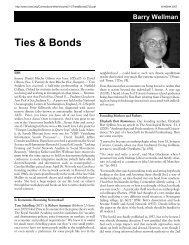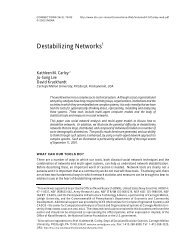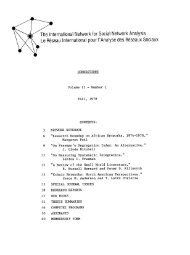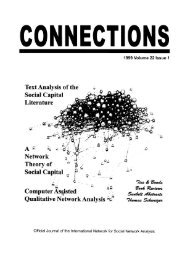(1979). Social Networks and Psychology. Connections, 2 - INSNA
(1979). Social Networks and Psychology. Connections, 2 - INSNA
(1979). Social Networks and Psychology. Connections, 2 - INSNA
Create successful ePaper yourself
Turn your PDF publications into a flip-book with our unique Google optimized e-Paper software.
- 82 -<strong>Social</strong>ist-Communist alliance, prior to its eventual collapse in 1978, placed an emphasis on concrete policyproposals - <strong>and</strong> even led to a fetishistic emphasis on 'concrete analysis', as though theory was a thingof the past . In Britain where, unlike France, a labour party has regularly been elected to power <strong>and</strong>where the empiricism of thought is a commonplace, the critique of structuralist Marxism was based on itsfailure to address questions of class formation <strong>and</strong> the role of left parties in power .Thus, the 1974-79 period has seen the emergence in British urban sociology of a new perspective, helpedalong by the evolution of the things-to-be-explained, <strong>and</strong> subjected to a vigorous debate within theperspective . Just as in France where a new journal, Espaces et Societes, was launched (in 1970) on thecrest of the new wave there, so in Britain seven years later the International Journal of Urban <strong>and</strong>Regional Researchl gave institutional expression to the new perspective .What are the implications of this for the study of social networks?One response would be to say that social networks are a thing of the past, necessarily linked to anoutworn functionalist theoretical perspective . The absence of any reference to social networks at theNottingham conference might seem to support this view .In my opinion however such a response is quite -misleading . <strong>Social</strong> networks are an aspect of reality 2<strong>and</strong> can be viewed within a variety of perspectives, their theoretical significance changing according tothe perspective .If this suggestion is correct the question is, what is the significance of social networks from theperspective of Marxist urban sociology .The first answer is that since they refer to inter-personal relations they cannot be given explanatorypriority for the types of thing-to-be-explained that are usual in Marxist studies . For example, if we aretalking about class formation the primary factor is common class position : inter-personal relations canonly be an effect not a cause of class formation .Second, the term inter-personal relations blurs the issue of the social location of the "persons"concerned . It creates equality between 'persons' in the same way that citizenship or universal suffragedoes . The key question is whether the inter-personal relations extend across class lines or remain withina single class . This brings us to the "hidden agenda" of network analysis, that implicitly networks referto persons of similar equal status, or to spheres of life which are non-hierarchical (e .g . kinship orfriendship, rather than work) . Such implicit definitions limit the applicability of the concept .Apart from these general conceptual points, two more substantive points can be made .First, from the Marxist perspective social networks of particular kinds will be of most interest, forexample networks linking politicians <strong>and</strong> businessmen will be important (but not essential - given the 'nondecision'debate) evidence regarding the process by which capitalist interests are reflected in state policy .Similarly the process by which a political organization recruits its members, <strong>and</strong> subsequently retainstheir commitment can be partly analysed by examining the networks involved . However in neither case isit likely that studying social networks will provide more than one element in a final explanation . Forexample it may be hypothesized that capitalist-politician network links are only activated, <strong>and</strong> so becomecausally important, when there is a threat to the institutionally built-in tendency for state policy toserve capitalist interests . This latter tendency is as, if not more, important than the network links .Second, from a Marxist perspective social networks of a given kind will be interpreted in a differentway . Three examples may be given . (a) The widely-reported wariness about forming relationships amongresidents on a new estate whose move has involved a large financial sacrifice can be directly related totheir economic position rather than to some alleged 'impersonal' quality of house or estate design. (b)<strong>Social</strong> networks in so far as they are elements of particular life styles, act as symbolic markers ofdifferent 'levels' of consumption which bear some relation to positions in the workplace . (c) The'objective needs' to which social network formation is a response e .g . living a long distance from relatives<strong>and</strong> so having to find a babysitter on an exchange or payment basis, may be directly related to the differentlabour mobility patterns imposed on middle <strong>and</strong> working class workers (see Bell 1968) .I would not want to 'reduce' the formation of social networks to some set of imperatives unique tocapitalist societies, nor reduce the consumption sphere to the production sphere, but it would seem worthwhileto approach the explanation of networks from this perspective as well as others .To sum up, I have argued that the new perspective which has come to prevail in British urban sociologydoes not negate the study of social networks but rather offers a new explanatory perspective in which theywill have a secondary but real place .
















